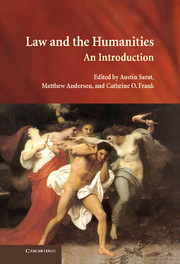Book contents
- Frontmatter
- Contents
- Contributors
- Acknowledgments
- Introduction: On the Origins and Prospects of the Humanistic Study of Law
- I PERSPECTIVES ON THE HISTORY AND SIGNIFICANCE OF SCHOLARSHIP IN LAW AND THE HUMANITIES: THREE VIEWS
- II IDEAS OF JUSTICE
- III IMAGINING THE LAW
- IV LINGUISTIC, LITERARY, AND CULTURAL PROCESSES IN LAW
- 12 Language
- 13 Interpretation
- 14 Narrative and Rhetoric
- 15 Justice as Translation
- 16 The Constitution of History and Memory
- V INSTITUTIONAL PROCESSES
- Index
- References
14 - Narrative and Rhetoric
Published online by Cambridge University Press: 20 January 2010
- Frontmatter
- Contents
- Contributors
- Acknowledgments
- Introduction: On the Origins and Prospects of the Humanistic Study of Law
- I PERSPECTIVES ON THE HISTORY AND SIGNIFICANCE OF SCHOLARSHIP IN LAW AND THE HUMANITIES: THREE VIEWS
- II IDEAS OF JUSTICE
- III IMAGINING THE LAW
- IV LINGUISTIC, LITERARY, AND CULTURAL PROCESSES IN LAW
- 12 Language
- 13 Interpretation
- 14 Narrative and Rhetoric
- 15 Justice as Translation
- 16 The Constitution of History and Memory
- V INSTITUTIONAL PROCESSES
- Index
- References
Summary
To speak of law in terms of rhetoric is already, in some sense, to court redundancy. Law is, after all, a matter of persuasion, and distinguishing law from rhetoric thus amounts to the impossible task – to call up Yeats's famous line in “Among School Children” – of “know[ing] the dancer from the dance.” Yet despite this intimate, indeed inseparable connection that would lead one to the conclusion that law is rhetoric, discussions of law nonetheless often failed to take this affinity into account, assuming instead a transparency through which law emerged as a distinct and discrete entity, a truth to be discovered and described in language rather than a state of affairs that language itself brings into being. Moreover, the idea that law is about (or indistinguishable from) rhetoric conjures negative images of fast-talking lawyers, murky jargon, and the seduction of virtuoso performances at the expense of plain truth. To think of law in terms of rhetoric, Austin Sarat and Thomas Kearns have noted, might “seem to let law off too easily by displacing the question of justice.” In so doing, it places law in a position that simultaneously acknowledges and disavows its dependence on rhetoric. Sarat and Kearns thus observe, “It appears, then, that to insist on the importance of the rhetoric of law is to highlight an opposition with law's conception of itself.”
This chapter will highlight several key approaches to law and rhetoric since their appearance – or more accurately, resurgence – in the 1970s.
- Type
- Chapter
- Information
- Law and the HumanitiesAn Introduction, pp. 377 - 397Publisher: Cambridge University PressPrint publication year: 2009



